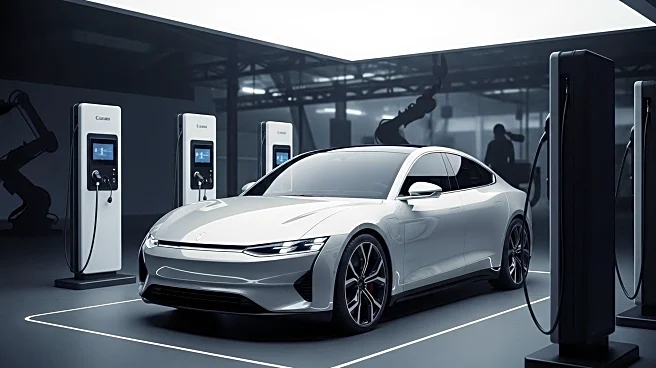What is the story about?
What's Happening?
Volkswagen Group is experiencing significant delays in the launch of its electric vehicles due to ongoing software issues and challenges in its partnership with Rivian. The collaboration, initially intended to enhance Volkswagen's software capabilities, has encountered turbulence, leading to postponed launches of key models such as Audi's Q8 e-tron SUV and A4 e-tron, now expected in 2028. Additionally, Porsche's K1 SUV, a battery electric model, has been indefinitely delayed. The partnership aimed to leverage Rivian's software expertise, but integration issues have arisen, particularly as Rivian's software was not designed for internal combustion engines, which Volkswagen plans to continue producing longer than initially planned.
Why It's Important?
The delays in Volkswagen's electric vehicle launches highlight the broader challenges automakers face in transitioning to electric mobility, particularly in software development. This situation underscores the complexity of integrating new technologies across diverse vehicle platforms. The delays could impact Volkswagen's competitiveness in the rapidly evolving electric vehicle market, where timely innovation is crucial. Furthermore, the reliance on Rivian's software, which is not compatible with internal combustion engines, complicates Volkswagen's strategy to maintain a diverse product lineup. This development may affect Volkswagen's market share and financial performance, especially in the U.S., where Porsche faces additional pressure from tariffs.
What's Next?
Volkswagen is expected to announce revised launch schedules and software strategies on October 7, 2025. The company may need to rely on interim solutions, including its CARIAD software division, to address the delays. The partnership with Rivian will require further negotiation to resolve software customization disputes, particularly for brands like Audi and Porsche that demand high levels of customization. The outcome of these negotiations will be critical in determining Volkswagen's ability to meet its electric vehicle production goals and maintain its market position.
Beyond the Headlines
The challenges faced by Volkswagen in its partnership with Rivian reflect broader industry trends where traditional automakers are increasingly dependent on tech companies for software solutions. This dependency raises questions about the future of automotive manufacturing and the role of software in vehicle design and functionality. The situation also highlights the potential risks of strategic partnerships in rapidly changing technological landscapes, where misalignments can lead to significant operational and financial setbacks.

















